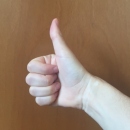
Phoebe in Wonderland is a movie about a young girl with obsessive-compulsive disorder (OCD) and Tourette Syndrome (TS). A few weeks ago I watched the film to see how they portrayed these conditions and I wanted to share my thoughts. (My opinion is mostly about their portrayal of OCD since that is what I have experience with.) trailer here!
The movie follows Phoebe, a creative girl who loves imagining characters and stories. Throughout the movie she begins to develop signs of OCD and TS. Her fun games she creates begin to turn into stressful and damaging compulsions; she also has uncontrollable tics. This creates a conflict because her parents do not want to stifle her creativity and uniqueness. However, they also do not want to let her stories and increasing rituals get out of control, causing Phoebe to be self-destructive.
The overarching plot is that Phoebe is participating in a play production of Alice in Wonderland. This allows her to have a healthy and helpful creative outlet, and a place where she can escape her rituals for a few hours. She forms a relationship with her drama teacher, who reassures Phoebe it’s okay to be different (movie clip here!). The movie also discusses bullying, which Phoebe encounters because of some of her tics and rituals.
Note on watching the film: Phoebe in Wonderland used to be on Netflix but is not at the moment. I believe it is available through amazon instant video in some countries, but not the US. If you really want to see it your best bet may be to try to rent or order a DVD copy. Since it is so hard to find a full copy to watch, I included several clips from the movie below!
 What I liked:
What I liked:
- Displayed several obsessions, compulsions, and tics, and not just stereotypical ones
- for example: obsessions about superstitions, taping compulsions, counting compulsions
- Movie clip of compulsions and tics; Movie clip of another tic
- Showed that OCD can be very damaging and emotionally distressing, especially when children don’t understand why they have to do the compulsions/tics
- Made is clear that it was not a choice and Phoebe couldn’t help doing the compulsions and tics
- Movie clip here! (Unrelated to OCD, but bonus points for challenging gender stereotypes!)
- Took OCD and TS seriously rather than using it just as a quirk for laughs
- Explored the conflict of giving children labels
- Mentioned the effect it can have on siblings
- Inclusion of The Red Queen’s Race metaphor (my favorite metaphor)
- Cute kids
 What I disliked:
What I disliked:
- Did not show any exposure and response prevention therapy (ERP)
- Should have shown more of her therapy sessions overall
- Although great for Phoebe, it was unrealistic that she got a diagnosis within months of showing symptoms. (This should be what happens but instead is very rare.)
- Focused more on the TS diagnosis, rather than giving OCD equal weight
Ratings: 8/10 (overall average)
Accuracy: 4/5
Educational Value: 4/5
Sensitivity: 5/5
In summary, I thought it was a sweet film that handled the topic well and did some good for raising awareness. They included a decent amount of factual information without clouding the story and other themes. I really enjoyed it and recommend watching it if you can find a copy.
~Morgan
#Blog4MH
P.S. I’m hoping to do more posts about the portrayal of OCD/mental health in media. If you know of other films or TV shows that depict OCD please share!

[…] Phoebe in Wonderland: OCD in Media – by Morgan R. […]
LikeLike
Thanks for sharing about this film, Morgan! I’m always on the lookout for interesting documentaries and the fact that the portrayal of OCD in this film was pretty good is definitely a plus. I’m going to have to try and look for this!
LikeLiked by 1 person
It’s my pleasure! I was very impressed by this movie. Good luck looking for a copy!
LikeLike
[…] OCD in Media #1: Phoebe in Wonderland […]
LikeLike
I liked the movie, but agree that they should have shown ERP. Also, I watched this multiple times while I was at my rock-bottom worst (pre-diagnosis) and still didn’t recognize any of my own symptoms as OCD. I came away still thinking OCD was about handwashing and other “obvious” rituals like counting and repetition, when in fact it’s often much more internal and varied. All in all, an artistic exploration rather than a solidly informative take on the disorder.
LikeLiked by 1 person